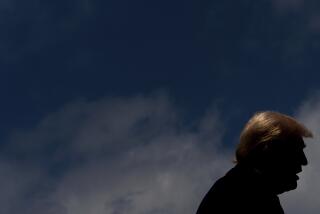Bess Truman’s Silent Anger Told : Margaret’s New Book Paints Different Picture of Mother
- Share via
WASHINGTON — Bess Truman, feeling cut off from her husband when he abruptly became President, felt “a smoldering anger that was tantamount to emotional separation,” her daughter says in a new book.
The portrait of the former First Lady that emerges from the book clashes with the perception of the good-soldier political wife who went along with everything her husband did. Harry S. Truman always said that his wife was his closest political adviser; he called her “The Boss.”
Margaret Truman Daniel’s biography of her mother, entitled “Bess W. Truman,” reveals that Mrs. Truman had difficulty adjusting to life in the White House after Franklin D. Roosevelt died and Vice President Truman assumed the presidency in April, 1945. The book, published by Macmillan, is drawn from more than 1,000 Bess Truman letters found after her death.
Truman had always treated his wife as a partner, but he failed to consult her when he decided to drop the atomic bomb on Japan in August, 1945, and that forced her to acknowledge her new role, Daniel wrote.
“She did not like the way the news had taken her by surprise. . . . She was forced to face a very unpleasant fact. She had become a spectator rather than a partner in Harry Truman’s presidency,” the book says. “That made her very, very angry.”
Although she had lived in Washington for 11 years, Bess Truman suffered from the “White House blues” and homesickness for Independence, Mo., when she became First Lady.
She was never enthusiastic about political life, Daniel said.
“There is a picture showing mother and me as the final count was announced” at the Democratic convention which nominated Truman for vice president in 1944, she wrote. “I am cheering my head off. Mother is barely able to muster a smile.”
“All of these negative feelings came to a boil at the end of December, 1945, when we went home for Christmas,” Daniel said. Truman stayed in Washington for business, flying to Missouri on Christmas Day in bad weather.
Newspapers criticized the President for risking the flight, but Mrs. Truman had little sympathy when he arrived, his daughter said.
She wrote: “In the privacy of their bedroom, the conversation went something like this: ‘So you’ve finally arrived. . . . I guess you couldn’t think of any more reasons to stay away. As far as I’m concerned, you might as well have stayed in Washington.’ ”
Three days later, Truman, back in Washington, wrote his wife a letter: “You can never appreciate what it means to come home as I did the other evening after doing at least one hundred things I didn’t want to do and have the only person in the world whose approval and good opinion I value look at me like I’m something the cat dragged in. . . .
“I wonder why we are made so that what we really think and feel we cover up?”
More to Read
Sign up for our Book Club newsletter
Get the latest news, events and more from the Los Angeles Times Book Club, and help us get L.A. reading and talking.
You may occasionally receive promotional content from the Los Angeles Times.









